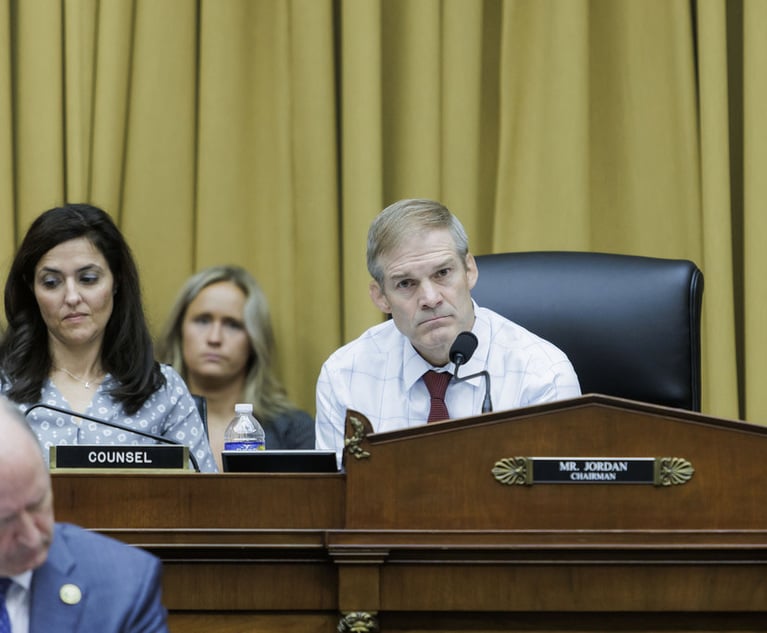US Justice Dept. Defends IRS Power in Marijuana Dispensary's Tax Case
The U.S. Supreme Court has been reluctant to step into conflicts surrounding the burgeoning recreational marijuana industry in America, and the U.S. Justice Department now wants the justices to maintain their hands-off stance in a fight involving the Internal Revenue Service.
February 05, 2018 at 03:14 PM
5 minute read
 US solicitor general's office at Justice Department. Credit: Mike Scarcella / ALM
US solicitor general's office at Justice Department. Credit: Mike Scarcella / ALM
The U.S. Supreme Court has been reluctant to step into conflicts surrounding the burgeoning recreational marijuana industry in America, and the U.S. Justice Department now wants the justices to maintain their hands-off stance in a fight involving the Internal Revenue Service.
The Justice Department, in a brief filed by U.S. Solicitor General Noel Francisco, urges the high court to deny review in the case Green Solution Retail v. United States. The Colorado marijuana retail chain contends the IRS is abusing its authority by investigating—for purposes of a tax assessment—whether the chain engages in illegal federal drug trafficking.
A federal tax code provision—Section 280E—prohibits businesses from claiming certain deductions and credits on their federal income tax returns if they are engaged in illegal trafficking of a controlled substance. Marijuana is classified as a Schedule I controlled substance and federal law makes it illegal to knowingly or intentionally manufacture, distribute or dispense it. “That prohibition applies even in states that have purported to legalize marijuana in some circumstances,” Francisco told the high court.
The Supreme Court case stems from an IRS audit of the 2013 and 2014 tax returns filed by The Green Solution and one of its owners. The retail chain and its owner claimed deductions for business expenses. The IRS initially determined that the business activities were among those covered by Section 280E and asked for documents and other information about the marijuana dispensary. The chain and its owner refused to comply and filed suit seeking declaratory and injunctive relief.
A federal district court dismissed the lawsuit. It held that the Anti-Injunction Act barred the request to enjoin the IRS from enforcing Section 280E and declaratory relief was barred by the tax exception to the Declaratory Judgment Act. The U.S. Court of Appeals for the Tenth Circuit affirmed.
In the high court, the marijuana chain, represented by James Thorburn of Thorburn Walker in Greenwood Village, Colorado, contends the auditor and the IRS are sharing information with the Justice Department for future prosecution purposes. The petition raises these issues: whether the IRS has authority to investigate and determine that a taxpayer is engaged in illegal drug trafficking, and whether the Anti-Injunction Act and the tax exception to the Declaratory Judgment Act bar their lawsuit.
Francisco's office first counters that there is no conflict with any high court or appellate court decisions. The Supreme Court, Francisco wrote, “has consistently held that the Anti-Injunction Act precludes efforts to restrain the assessment or collection of taxes directly” and appellate courts “uniformly” have held that includes “activities leading up to, and culminating in, such assessment and collection.”
The Declaratory Judgment Act's bar on relief with respect to federal taxes, he added, is at least as broad as the Anti-Injunction Act. And on IRS authority in this case, Francisco wrote: “The relevant Internal Revenue Code provisions do not authorize the IRS to initiate or conduct criminal prosecutions under the Controlled Substances Act, but simply authorize the agency to determine, for civil tax purposes, whether taxpayers may claim credits or deductions for particular expenses.” He added:
“The fact that this inquiry turns in part on whether a business's activities are among those Congress has prohibited does not mean that the IRS is enforcing the criminal laws as such.”
Robert Mikos of Vanderbilt University Law School, a federalism and marijuana law scholar, said the Anti-Injunction Act issue is important and that “ramifications would be felt for firms outside of the marijuana industry.”
This case, Mikos added, is centrally about the implications of how to challenge a tax and “that's just not confined to a company that happens to be selling marijuana.” Marijuana firms have a greater incentive to “cheer on” the use of this legal argument because they face higher tax rates than other firms under federal law, Mikos said. “But lots of others will be watching it,” he said.
The Supreme Court has turned away marijuana-related cases in recent years. In one of the most recent, the justices in 2016 declined to take up a dispute—filed by Nebraska and Oklahoma—that challenged Colorado's state-legal marijuana scheme.
The Justice Department's brief is posted below:
Read more:
This content has been archived. It is available through our partners, LexisNexis® and Bloomberg Law.
To view this content, please continue to their sites.
Not a Lexis Subscriber?
Subscribe Now
Not a Bloomberg Law Subscriber?
Subscribe Now
NOT FOR REPRINT
© 2024 ALM Global, LLC, All Rights Reserved. Request academic re-use from www.copyright.com. All other uses, submit a request to [email protected]. For more information visit Asset & Logo Licensing.
You Might Like
View All
'Health Care Behemoth'?: DOJ Seeks Injunction Blocking $3.3B UnitedHealth Merger Proposal
3 minute read
NLRB Bans 'Captive Audience' Meetings, Yanking Away Platform Employers Used to Combat Unionizing

Freshfields Hires DOJ Official, Squire Taps Paul Hastings Atty for US Antitrust Head
3 minute read
How Big Law Congressional Investigation Practices Will Stay Busy in 2025
5 minute readTrending Stories
- 1Trump Nominates Ex-SEC Chief Jay Clayton to Helm Southern District of New York US Attorney's Office
- 2Steward Health CEO Saga Signals Escalation of Coercive Congressional Oversight Against Private Parties
- 3'They Should Have Tried to Negotiate': Jury Finds Against Insurer
- 4Expert Testimony Regarding Sexual Grooming
- 5Actions Speak Louder Than Words: Law Firms Shrink From 'Performative' Statements
Who Got The Work
Michael G. Bongiorno, Andrew Scott Dulberg and Elizabeth E. Driscoll from Wilmer Cutler Pickering Hale and Dorr have stepped in to represent Symbotic Inc., an A.I.-enabled technology platform that focuses on increasing supply chain efficiency, and other defendants in a pending shareholder derivative lawsuit. The case, filed Oct. 2 in Massachusetts District Court by the Brown Law Firm on behalf of Stephen Austen, accuses certain officers and directors of misleading investors in regard to Symbotic's potential for margin growth by failing to disclose that the company was not equipped to timely deploy its systems or manage expenses through project delays. The case, assigned to U.S. District Judge Nathaniel M. Gorton, is 1:24-cv-12522, Austen v. Cohen et al.
Who Got The Work
Edmund Polubinski and Marie Killmond of Davis Polk & Wardwell have entered appearances for data platform software development company MongoDB and other defendants in a pending shareholder derivative lawsuit. The action, filed Oct. 7 in New York Southern District Court by the Brown Law Firm, accuses the company's directors and/or officers of falsely expressing confidence in the company’s restructuring of its sales incentive plan and downplaying the severity of decreases in its upfront commitments. The case is 1:24-cv-07594, Roy v. Ittycheria et al.
Who Got The Work
Amy O. Bruchs and Kurt F. Ellison of Michael Best & Friedrich have entered appearances for Epic Systems Corp. in a pending employment discrimination lawsuit. The suit was filed Sept. 7 in Wisconsin Western District Court by Levine Eisberner LLC and Siri & Glimstad on behalf of a project manager who claims that he was wrongfully terminated after applying for a religious exemption to the defendant's COVID-19 vaccine mandate. The case, assigned to U.S. Magistrate Judge Anita Marie Boor, is 3:24-cv-00630, Secker, Nathan v. Epic Systems Corporation.
Who Got The Work
David X. Sullivan, Thomas J. Finn and Gregory A. Hall from McCarter & English have entered appearances for Sunrun Installation Services in a pending civil rights lawsuit. The complaint was filed Sept. 4 in Connecticut District Court by attorney Robert M. Berke on behalf of former employee George Edward Steins, who was arrested and charged with employing an unregistered home improvement salesperson. The complaint alleges that had Sunrun informed the Connecticut Department of Consumer Protection that the plaintiff's employment had ended in 2017 and that he no longer held Sunrun's home improvement contractor license, he would not have been hit with charges, which were dismissed in May 2024. The case, assigned to U.S. District Judge Jeffrey A. Meyer, is 3:24-cv-01423, Steins v. Sunrun, Inc. et al.
Who Got The Work
Greenberg Traurig shareholder Joshua L. Raskin has entered an appearance for boohoo.com UK Ltd. in a pending patent infringement lawsuit. The suit, filed Sept. 3 in Texas Eastern District Court by Rozier Hardt McDonough on behalf of Alto Dynamics, asserts five patents related to an online shopping platform. The case, assigned to U.S. District Judge Rodney Gilstrap, is 2:24-cv-00719, Alto Dynamics, LLC v. boohoo.com UK Limited.
Featured Firms
Law Offices of Gary Martin Hays & Associates, P.C.
(470) 294-1674
Law Offices of Mark E. Salomone
(857) 444-6468
Smith & Hassler
(713) 739-1250







